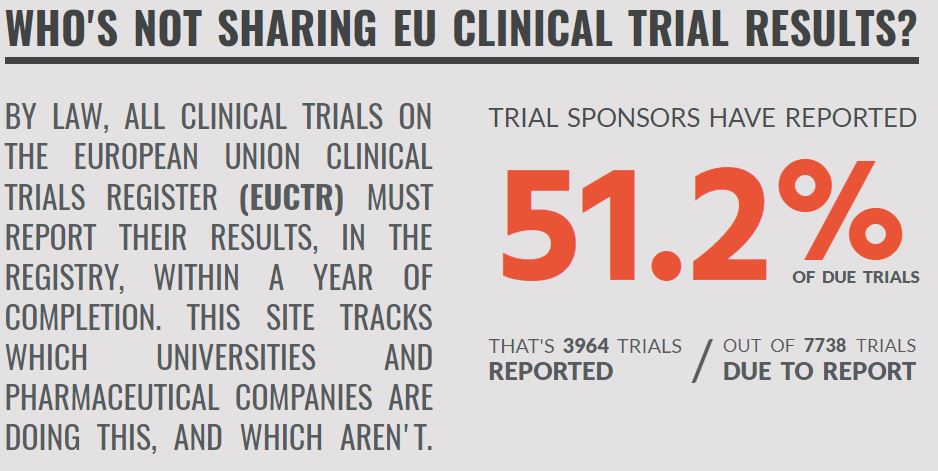A new study, published in the British Medical Journal (BMJ), has found that research sponsors continue to fail at reporting their results as required by recent legislation. More than half of new clinical trials in the European Union failed to comply with this legislation.
The authors, led by Ben Goldacre at the University of Oxford, write that “Compliance with the European Commission requirement for all trials to post results on to the EUCTR within 12 months of completion has been poor, with half of all trials non-compliant.”

One of the problems in clinical trial research is that negative results often go unpublished. That is, researchers have a difficult time publishing studies in which they do not find the hoped-for results. Research journals are less likely to publish studies in which researchers find that their hypotheses were unsupported, and industry pressure may bury trials in which particular medications do not show efficacy.
When this happens, unfortunately, doctors and consumers are only aware of positive trials. They may not be aware of the dozens of failed experiments showing that medications are ineffective, because these results were not published.
To solve this problem, the US, the EU, and other national and international bodies have created legislation designed to force research sponsors to post their results—whether they find what they are looking for or not. For instance, the FDA Amendments Act 2007 (FDAAA) requires that studies in the US post results on the clinicaltrials.gov website. However, studies have found that only about 20% of trials comply with this requirement.
Similarly, since 2004, studies in the EU have been required to post results to the European Union Clinical Trials Register (EUCTR). Goldacre and his colleagues designed the current study, the first of its kind in the EU, to determine if Europe suffers from the same problem as the US.
The results were sobering. Only 49.5% of the trials accurately reported their findings on the EUCTR. One good sign was that more recent studies were significantly more likely to report their results, so this trend may be shifting.
Commercial sponsors, such as those within the pharmaceutical industry, were particularly good at reporting their results, with 68.1% on average (although Eli Lilly was an exception, at 47.7%). This was consistent with previous US research. After all, most industry sponsors have entire departments dedicated to compliance with regulations. However, commercial sponsors also tended to have a high percentage of inconsistent data and errors in reporting.
It was primarily university-led studies that failed to comply with regulations, with 11% of trials reported on average. Dozens of universities had 0% reporting. The Hospitals of Paris was also a notable 0% reporter. According to Goldacre and his colleagues:
“Sponsors doing fewer trials, and non-commercial sponsors such as universities, have particularly low reporting rates: they may be more likely to be unaware of their obligations or lack administrative procedures to flag breaches and support compliance among their researchers.”
Goldacre and colleagues also write that “Extensive evidence was found of errors, omissions, and contradictory entries in EUCTR data that prevented ascertainment of compliance for some trials.”
This is not the first time Goldacre has called out research sponsors who have failed to comply with this legislation. Earlier this year, he created a website, eu.trialstracker.net, that lists noncompliant sponsors, whether they be industry, university, or government. The TrialTracker website updates periodically to provide this information to consumers, funding sources, and other researchers.
****
Goldacre, B., DeVito, N. J., Heneghan, C., Irving, F., Bacon, S., Fleminger, J., & Curtis, H. (2018). Compliance with requirement to report results on the EU Clinical Trials Register: cohort study and web resource. BMJ, 362(k3218). http://dx.doi.org/10.1136/bmj.k3218 (Link)















I think the title should be, “Fewer than half…” not “Less than half…” since we’re talking about the number of studies here. Just sayin’.
I see this all the time. Yesterday on a website I saw witch instead of which. Maybe they spelled it that way to be seasonal.
I wish the general public had easier access to texts of medical studies. A lot of the time I try to open a pdf and they want me to pay. Of course they do not want the public to be informed, so they can maintain their power and authority over us.
Report comment
A lot of people don’t access the readily available knowledge online. Like articles published in the APA Journal. Following links I provide and reading pieces of under 500 words is too much work I guess.
Hey the drug commercials and ad brochures would never lie, now would they? 🙁
Report comment